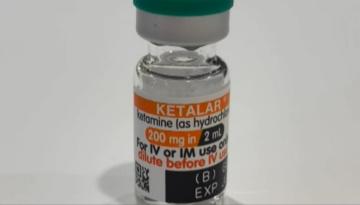University of Otago researchers are looking into if ketamine can treat depression and want Kiwis to take part in a trial of the drug.
The study will take place in Christchurch and Dunedin with volunteers aged between 18 and 65 who have tried traditional anti-depressant medications but haven't found any relief.
Senior lecturer of psychological medicine Dr Ben Beaglehole on Wednesday told AM that ketamine, which has been used as a horse tranquiliser or recreational drug, has also been used in medicine for many years, including by anesthetists and emergency department physicians.
He said for the past 20 years, ketamine has been repurposed as a medication for depression and is especially promising for treatment-resistant depression.
"It's now pretty well established that ketamine works well in the short-term treatment of depression.
"But that still leaves questions for psychiatrists like myself as to its place in the long-term management of depression which is actually a longer term illness."
The anesthetic drug been used legally by doctors in New Zealand since the 1950's for sedation and pain relief, but classified as an illegal drug for recreational use since the 1980's.
Beaglehole said ketamine was a dissociative anesthetic, explaining that in high doses it seems to detach people from pain and their surroundings and in slightly lower doses it has some psychedelic or "mind-altering" effects.
However, he added that with depression they're looking at if some of the metabolites or "downstream chemicals" in ketamine are important in its anti-depressant effect.
Beaglehole said most studies to date are short-term and involve injectable ketamine which causes "quite a considerable trip for the patient".
"And because, as I said, depression is a long-term problem our study is a bit different," he said.
"So, we're giving people a course of ketamine over eight weeks and we're giving half the participants a course of psychotherapy - one of the recommended treatments for depression – to see if the addition of psychotherapy can maintain, enhance and prolong the effects of ketamine."
The doses of ketamine will vary depending on each participant's depression scores, but they'll receive the injectable ketamine in a liquid sipped slowly over an hour twice a week.
Beaglehole said participants "won't be out of it" and instead will have mild effects of the drug compared to if they had an injection.
He added that there's also a second phase to the study where researchers will observe participants' moods for a further three months after the course finishes.
They'll be looking at differences between the group who had psychotherapy and those who received ketamine alone.
"We're trying to figure out if the additional psychotherapy makes a difference, and for participants this could be a bit of a rollercoaster if they do respond to the treatment then their mood might deteriorate and we're not in a position to keep offering them ketamine after the study ends."
Researchers are hoping for about 60 people to take part in the trial over three years.
So far, about five people have been recruited for the study.
"We think people will be interested because this is one of the most exciting new treatments on the horizon that we've had in a long time," Beaglehole said.


